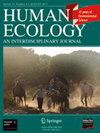加纳西部手工渔业的当地生态知识、捕捞特征和Elasmobranch枯竭证据
IF 1.7
3区 社会学
Q1 ANTHROPOLOGY
引用次数: 1
摘要
本文章由计算机程序翻译,如有差异,请以英文原文为准。
Local Ecological Knowledge, Catch Characteristics, and Evidence of Elasmobranch Depletions in Western Ghana Artisanal Fisheries
求助全文
通过发布文献求助,成功后即可免费获取论文全文。
去求助
来源期刊

Human Ecology
Multiple-
CiteScore
3.10
自引率
5.00%
发文量
64
期刊介绍:
The theoretical orientation of Human Ecology emphasizes the problem-solving significance of human culture and behavior, from food procurement to systems defining kinship—not to mention political and religious life. The perspective generally embraced here is that human ecology is part and parcel of the larger field of ecology and not simply analogous to it. Contributions to Human Ecology emphasize the complex ways in which humans shape and in turn are shaped by their environment. Original articles, research reports, and brief communications based on empirical research are welcome from fields as diverse as environmental impact studies, resource or habitat maintenance, health and nutrition, risk management, land use history—to name a few. Disciplines commonly represented include anthropology, biological, life and health sciences, geography, and sociology. The journal is peer reviewed. A book review section appears in each issue.
 求助内容:
求助内容: 应助结果提醒方式:
应助结果提醒方式:


